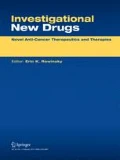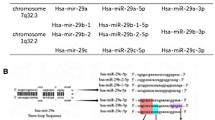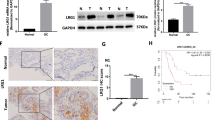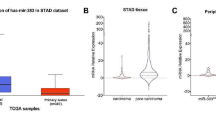Summary
Transforming growth factor-beta (TGF-β) signaling pathway plays pivotal roles in various types of cancer. TGF-β receptor 2 (TGFβR2) contains a kinase domain that phosphorylates and activates the downstream of the TGF-β signaling pathway. Our previous microarray analysis revealed marked changes in miR-181a expression in gastric cancers, and the bioinformatics analysis suggested that miR-181a negatively regulated TGFβR2. In order to verify the effect of miR-181a on TGFβR2 and clarify the influence of miR-181a on the migration and proliferation of gastric cancer, studies in gastric cancer cell lines and xenograft mouse models were carried out. We found that a reduced expression of TGFβR2 and an increased expression miR-181a in gastric cancer tissues compared to adjacent noncancerous tissues. A luciferase reporter assay confirmed that TGFβR2 was a target of miR-181a. In addition, we found that miR-181a mimics, which increased the level of miR-181a, downregulated the expression of TGFβR2 in the gastric cancer cell line SGC-7901. Moreover, both the overexpression of miR-181a and the downregulation of TGFβR2 promoted the migration and proliferation of SGC-7901 cells. Conversely, SGC-7901 cell migration and proliferation were inhibited by the downregulation of miR-181a and the overexpression of TGFβR2. Furthermore, the increased expression of miR-181a and the decreased expression of TGFβR2 also enhanced the tumor growth in mice bearing gastric cancer. Our results herein indicated that miR-181a promoted the migration and proliferation of gastric cancer cells by downregulating TGFβR2 at the posttranscriptional level. The present study suggests that miR-181a is a novel negative regulator of TGFβR2 in the TGF-β signaling pathway and thus represents a potential new therapeutic target for gastric cancer.






Similar content being viewed by others
Data availability
The datasets supporting the conclusions of this article are included within the article.
Abbreviations
- 3’-UTR:
-
3′-untranslated region
- CCK-8:
-
Cell Counting Kit-8
- cDNA:
-
complementary deoxyribonucleic acid
- EdU:
-
5-ethynyl-2-deoxyuridine
- HER-2:
-
epidermal growth factor receptor-2
- miRNA:
-
microRNA
- RT-qPCR:
-
real-time quantitative polymerase chain reaction
- siRNA:
-
small interfering RNA
- TGF-β:
-
transforming growth factor-beta
- TGFβR2:
-
TGF-β receptor 2
References
Katz LH, Likhter M, Jogunoori W, Belkin M, Ohshiro K, Mishra L (2016) TGF-beta signaling in liver and gastrointestinal cancers. Cancer Lett 379(2):166–172
Liu S, Chen S, Zeng J (2018) TGFbeta signaling: a complex role in tumorigenesis (review). Mol Med Rep 17(1):699–704
Shukla SK, Khatoon J, Prasad KN, Rai RP, Singh AK, Kumar S, Ghoshal UC, Krishnani N (2015) Transforming growth factor beta 1 (TGF-beta1) modulates Epstein-Barr virus reactivation in absence of Helicobacter pylori infection in patients with gastric cancer. Cytokine 77:176–179
Sun N, Xue Y, Dai T, Li X, Zheng N (2017) Tripartite motif containing 25 promotes proliferation and invasion of colorectal cancer cells through TGF-beta signaling. Biosci Rep 37(4)
Lee HJ, Park JM, Hahm KB (2016) Role of inhibitory transforming growth factor-beta signal Smad7 in helicobacter pylori-associated gastric damage. Korean J Gastroenterol 68(4):186–194
Jin B, Liu Y, Wang H (2016) Antagonism of miRNA-21 sensitizes human gastric Cancer cells to paclitaxel. Cell Biochem Biophys 72(1):275–282
Wang P, Li Z, Liu H, Zhou D, Fu A, Zhang E (2016) MicroRNA-126 increases chemosensitivity in drug-resistant gastric cancer cells by targeting EZH2. Biochem Biophys Res Commun 479(1):91–96
Eto K, Iwatsuki M, Watanabe M, Ida S, Ishimoto T, Iwagami S, Baba Y, Sakamoto Y, Miyamoto Y, Yoshida N, Baba H (2013) The microRNA-21/PTEN pathway regulates the sensitivity of HER2-positive gastric cancer cells to trastuzumab. Ann Surg Oncol 21(1):343–350
Chang H, Kim N, Park JH, Nam RH, Choi YJ, Park SM, Yoon H, Shin CM, Lee DH (2015) Helicobacter pylori might induce TGF-beta1-mediated EMT by means of cagE. Helicobacter 20(6):438–448
Wang WW, Yuan XL, Chen H, Xie GH, Ma YH, Zheng YX, Zhou YL, Shen LS (2015) CD19+CD24hiCD38hiBregs involved in downregulate helper T cells and upregulate regulatory T cells in gastric cancer. Oncotarget 6(32):33486–33499
Hu WQ, Wang LW, Yuan JP, Yan SG, Li JD, Zhao HL, Peng CW, Yang GF, Li Y (2014) High expression of transform growth factor beta 1 in gastric cancer confers worse outcome: results of a cohort study on 184 patients. Hepato-Gastroenterology 61(129):245–250
Kim YW, Park J, Lee HJ, Lee SY, Kim SJ (2012) TGF-beta sensitivity is determined by N-linked glycosylation of the type II TGF-beta receptor. Biochem J 445(3):403–411
Kim WS, Park C, Hong SK, Park BK, Kim HS, Park K (2000) Microsatellite instability (MSI) in non-small cell lung cancer (NSCLC) is highly associated with transforming growth factor-beta type II receptor (TGF-beta RII) frameshift mutation. Anticancer Res 20(3A):1499–1502
Guo W, Dong Z, Guo Y, Chen Z, Yang Z, Kuang G (2011) Association of polymorphisms in transforming growth factor-beta receptors with susceptibility to gastric cardia adenocarcinoma. Mol Biol Rep 39(4):4301–4309
Duan J, Zhang H, Qu Y, Deng T, Huang D, Liu R, Zhang L, Bai M, Zhou L, Ying G, Ba Y (2016) Onco-miR-130 promotes cell proliferation and migration by targeting TGFbetaR2 in gastric cancer. Oncotarget 7(28):44522–44533
Fragoso R, Mao T, Wang S, Schaffert S, Gong X, Yue S, Luong R, Min H, Yashiro-Ohtani Y, Davis M, Pear W, Chen CZ (2012) Modulating the strength and threshold of NOTCH oncogenic signals by mir-181a-1/b-1. PLoS Genet 8(8):e1002855
Ma YY, Tao HQ (2012) Microribonucleic acids and gastric cancer. Cancer Sci 103(4):620–625
Strotbek M, Schmid S, Sanchez-Gonzalez I, Boerries M, Busch H, Olayioye MA (2017) miR-181 elevates Akt signaling by co-targeting PHLPP2 and INPP4B phosphatases in luminal breast cancer. Int J Cancer 140(10):2310–2320
Cai ZG, Zhang SM, Zhang H, Zhou YY, Wu HB, Xu XP (2013) Aberrant expression of microRNAs involved in epithelial-mesenchymal transition of HT-29 cell line. Cell Biol Int 37(7):669–674
Liu J, Wu CP, Lu BF, Jiang JT (2014) Mechanism of T cell regulation by microRNAs. Cancer Biol Med 10(3):131–137
Chen Z, Wu L, Lin Q, Shi J, Lin X, Shi L (2016) Evaluation of miR-182/miR-100 ratio for diagnosis and survival prediction in bladder cancer. Arch Iran Med 19(9):645–651
Park SK, Park YS, Ahn JY, Do EJ, Kim D, Kim JE, Jung K, Byeon JS, Ye BD, Yang DH, Park SH, Hwang SW, Jung HY, Myung SJ (2016) MiR 21-5p as a predictor of recurrence in young gastric cancer patients. J Gastroenterol Hepatol 31(8):1429–1435
Jiang C, Fang X, Zhang H, Wang X, Li M, Jiang W, Tian F, Zhu L, Bian Z (2017) Triptolide inhibits the growth of osteosarcoma by regulating microRNA-181a via targeting PTEN gene in vivo and vitro. Tumour Biol 39(4):1010428317697556
Yang F, Liu X, Liu Y, Zhang C, Wang Z, Jiang T, Wang Y (2017) miR-181d/MALT1 regulatory axis attenuates mesenchymal phenotype through NF-kappaB pathways in glioblastoma. Cancer Lett 396:1–9
Liu YS, Lin HY, Lai SW, Huang CY, Huang BR, Chen PY, Wei KC, Lu DY (2017) MiR-181b modulates EGFR-dependent VCAM-1 expression and monocyte adhesion in glioblastoma. Oncogene 36(35):5006–5022
Butrym A, Rybka J, Baczynska D, Poreba R, Mazur G, Kuliczkowski K (2016) Expression of microRNA-181 determines response to treatment with azacitidine and predicts survival in elderly patients with acute myeloid leukaemia. Oncol Lett 12(4):2296–2300
Petrillo M, Zannoni GF, Beltrame L, Martinelli E, DiFeo A, Paracchini L, Craparotta I, Mannarino L, Vizzielli G, Scambia G, D'Incalci M, Romualdi C, Marchini S (2016) Identification of high-grade serous ovarian cancer miRNA species associated with survival and drug response in patients receiving neoadjuvant chemotherapy: a retrospective longitudinal analysis using matched tumor biopsies. Ann Oncol 27(4):625–634
Tian F, Shen Y, Chen Z, Li R, Lu J, Ge Q (2016) Aberrant miR-181b-5p and miR-486-5p expression in serum and tissue of non-small cell lung cancer. Gene 591(2):338–343
Liu J, Xing Y, Rong L (2018) miR-181 regulates cisplatin-resistant non-small cell lung cancer via downregulation of autophagy through the PTEN/PI3K/AKT pathway. Oncol Rep 39(4):1631–1639
Cho JH, Lim JY, Cho JY (2017) Survival analysis based on human epidermal growth factor 2 status in stage II-III gastric cancer. World J Gastroenterol 23(41):7407–7414
Szasz AM, Lanczky A, Nagy A, Forster S, Hark K, Green JE, Boussioutas A, Busuttil R, Szabo A, Gyorffy B (2016) Cross-validation of survival associated biomarkers in gastric cancer using transcriptomic data of 1,065 patients. Oncotarget 7(31):49322–49333
Shi Q, Zhou Z, Ye N, Chen Q, Zheng X, Fang M (2017) MiR-181a inhibits non-small cell lung cancer cell proliferation by targeting CDK1. Cancer Biomark 20(4):539–546
Weidle UH, Birzele F, Kollmorgen G, Nopora A (2017) Potential microRNA-related targets for therapeutic intervention with ovarian Cancer metastasis. Cancer Genomics Proteomics 15(1):1–15
Takei Y, Takigahira M, Mihara K, Tarumi Y, Yanagihara K (2010) The metastasis-associated microRNA miR-516a-3p is a novel therapeutic target for inhibiting peritoneal dissemination of human scirrhous gastric cancer. Cancer Res 71(4):1442–1453
Funding
This work was supported by the National Natural Science Foundation of China (nos. 81,772,629, 81,602,158, 81,602,156, 81,702,275 and 81,702,437) and the Tianjin Health and Family Planning Commission Foundation of Science and Technology (no. 15KG142).
Author information
Authors and Affiliations
Contributions
SG and HZ performed most of the experiments, analyzed the data, and wrote the manuscript. TD, WS and TN reviewed and edited the manuscript. QF performed some experiments. YB and GY designed the experiments and edited the manuscript. YB is the guarantor of this work and has unlimited access to all of the data in the study and thus takes responsibility for the integrity of the data and the accuracy of the data analysis.
Corresponding authors
Ethics declarations
Ethics approval and consent to participate
Animal care and experiments were performed in accordance with guidelines of the Institutional Animal Use Committee of Tianjin Medical University, and the procedures were approved by the Institutional Animal Care and Use Committee.
Consent for publication
Written informed consent for publication was obtained from all participants.
Competing interests
The authors have no competing interests to declare.
Rights and permissions
About this article
Cite this article
Ge, S., Zhang, H., Deng, T. et al. MiR-181a, a new regulator of TGF-β signaling, can promote cell migration and proliferation in gastric cancer. Invest New Drugs 37, 923–934 (2019). https://doi.org/10.1007/s10637-018-0695-5
Received:
Accepted:
Published:
Issue Date:
DOI: https://doi.org/10.1007/s10637-018-0695-5




